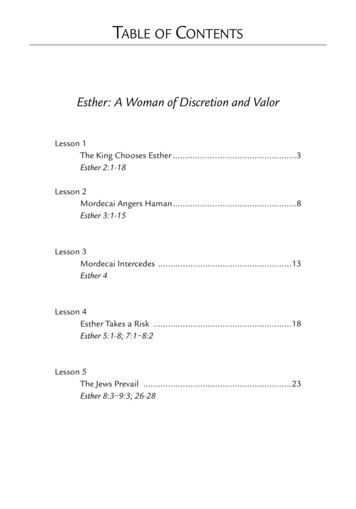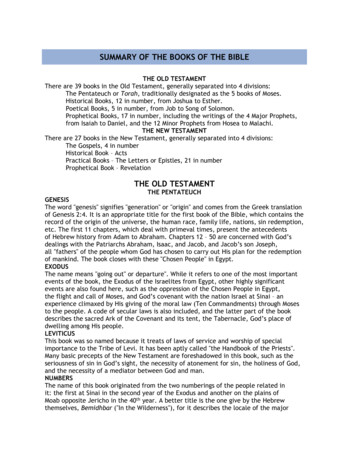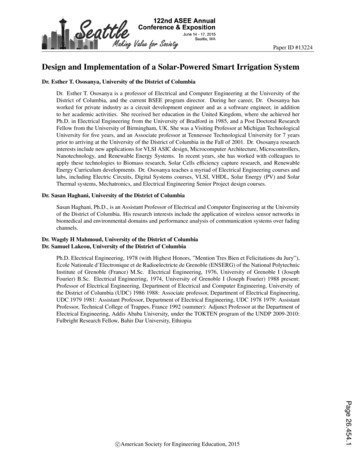
Transcription
Study Through the BibleEsther: FulfillingLife’s Missionq Click23on a study title you’d like to see qINTRODUCTIONStudy 1: We Flounder Without a MissionLeader’s Guide — Participant’s Guide12Study 2: We Are Tempted to Settle for aShadow MissionLeader’s Guide — Participant’s Guide19Study 3: We Need Courage to Fulfill Our MissionLeader’s Guide — Participant’s Guide29Study 4: With Jesus, We Can Fulfill Our MissionLeader’s Guide — Participant’s Guide1 2009 Christianity Today InternationalChristianBibleStudies.com
Esther: Fulfilling Life’s MissionIntroductionIntroductionHow to use the “Esther: Fulfilling Life’s Mission”quarterly series by ChristianBibleStudies.com.Why read this book?Have you ever wondered if God is really involved in the circumstances of your life? If so,you may wonder why life is such a struggle. The Book of Esther, like much of the Bible,tells the story of God’s involvement with his people. Unlike the rest of the Bible, however,this book shows God’s work indirectly. In fact, God’s name is not mentioned once, thoughhis influence permeates the narrative. The book demonstrates how God works in the livesof his people, both then and now.Who wrote this book?The author is unknown, but it is clear, from the tone and details throughout, that theauthor is a devout Jew. Possibly Mordecai, Ezra, or Nehemiah wrote it.Why was it written?As a history, to record the events leading to the establishment of the Jewish observance ofPurim (9:24–32), and as a way to assure the Jews of God’s protection.When and where was it written?In Persia, sometime between 460 and 350 b.c. Esther became queen in 479 b.c.What to look for in Esther:A revealing of God’s character, his faithfulness and how he provides for those who trusthim, even through events most of us would see as tragic. Notice the indirect allusions toGod’s involvement in the life of his people (4:14, 16).From the Quest Study Bible (Zondervan)2 2009 Christianity Today InternationalChristianBibleStudies.com
Esther: Fulfilling Life’s MissionWe Flounder Without a MissionLeader ’s GuideL e a d e r ’s G u i d eWe FlounderWithout a MissionWe need to live for more thanentertaining ourselves.Esther, along with the Old Testament booksSong of Solomon, Ruth, Lamentations, andEcclesiastes, are five scrolls that are read onvarious Jewish holidays. Esther provides us withthe history of the Jewish holiday Purim, or “lots,”named because Haman, an evil ruler, cast lots todetermine the day of the Jews’ annihilation. Esther isthe Jewish heroine who, along with her adoptive father, Mordecai, reversedHaman’s plan by influencing the King of the Persian Empire, Xerxes.Scr ipt ure: E st h er 1B ased On : Th e B ibl e s tu dy “B o o k o f E s ther, ” by J enn Pepp er s andTara M iller, FLo W, LLC ; and the s er m o n “M y Favo r ite H ero es : E s th e r, ”by J o h n Or t b erg, Pre a ching To d ay.co m .3 2009 Christianity Today InternationalChristianBibleStudies.com
Esther: Fulfilling Life’s MissionWe Flounder Without a MissionLeader ’s GuidePart 1Identify the IssueNo te to lea der : Provi de ea ch p e r son w ith t he Par ticipant ’s G uide,i n c lu ded at th e en d of th i s st udy.The author of the Book of Esther is unknown. It is believed to have been writtenbetween 464–330 BC. The story takes place during a 10-year span, from 486–465BC, during the Babylonian exile of the Jews. Although much is implied about thesovereign authority of God, the author never mentions God (this is also true of theSong of Solomon) or spiritual practices of the era such as prayer and sacrifice. Scholarsbelieve the omission is deliberate, perhaps because of how the story naturally reveals thecharacter of God. It speaks for itself.John Ortberg shares this story:Some time ago I went on a retreat, and one of the topics at this retreat was howwe’re all created for a mission; everybody was made for a reason, for a purpose,but if we don’t embrace that purpose, we have what one speaker called a shadowmission. We’re made for a mission, but the danger is that, on default mode, we’retempted to let our lives center around something kind of dark or selfish.One of the guys who had thought about this a lot said that his shadow missionwas to watch TV and engage in a destructive, addictive habit while the world goesto hell. And he put this in kind of raw language, and the guys laughed nervouslywhen he said it. And I’ll never forget this, he said: “Now I’m going to say this onemore time, only this time nobody laughs. My shadow mission is to watch TV andengage in this habit.”And we all sat there, struck by what a sad thing it is that life can easily deteriorateinto the pursuit of a shadow mission.We were made for a mission, but we have this temptation of a shadow mission. TheBook of Esther is a story of characters given a choice—numbers of them—between amission and a shadow mission. And people choose, and destinies get formed, and theworld gets changed.Discussion Questions:[Q] If someone asked you what your mission in life was, what would you say? Howhave you lived up to that mission? How have you defaulted to a shadow mission?[Q] Have you ever read the Book of Esther? If so, what was your impression of it?4 2009 Christianity Today InternationalChristianBibleStudies.com
Esther: Fulfilling Life’s MissionWe Flounder Without a MissionLeader ’s Guide[Q] When have you felt that your value, dignity, or sensibilities were threatened bysomeone who had greater power than you? How did you respond to that?[Q] What about the reverse? Did you ever feel that someone under your authorityshowed blatant disrespect for you? How did you handle that situation?Part 2Discover the Eternal PrinciplesTeaching Point One: Our values are shown by the way we live.Read Esther 1:1–12.Immediately we are introduced to King Xerxes of the Persian Empire, who ruled the areafrom what is now India to the northeast portion of Africa. This includes all of the MiddleEast and Egypt. The writer gives us a picture of a king who wants to show off his greatness.He’s very ostentatious, but in fact has no inner strength of spirit at all, and constantly needsother people to make up his mind about stuff.The first time we see him is at a banquet. There are three banquets in these verses alone.One of the ways you can divide up the book is as a series of banquets. And this first onelasts 180 days—six months of serious partying. And then when it’s over, in verse 5, hehas another party for the whole capital, open to the common people so that they’ll beoverwhelmed by his immense power and wealth. The goblets are not only outrageouslyexpensive, but each one is unique. And verse 8 says that the drinking is literally withoutrestraint. It turns the palace into Animal House. In verse 9, there’s a third banquet, thrownby the Queen Vashti. Here there are no excesses, no juvenile behavior. By contrast, she looksquite restrained.[Q] What observations can you make about Xerxes’ leadership? Was he vain, selfindulgent, intimidating, controlling, immoral? Explain.[Q] Imagine you were a guest at this first banquet held in Susa (now western Iran)?How would you describe it to a friend?[Q] On the seventh day of the banquet, a drunken King Xerxes decides to put his wifeon display. Which of the following best describes Queen Vashti’s refusal to obey theking, and why? Self respect Blatant disobedience5 2009 Christianity Today InternationalChristianBibleStudies.com
Esther: Fulfilling Life’s MissionWe Flounder Without a MissionLeader ’s Guide Disrespectful to the king Courageous[Q] In these verses, we get a sense of the values of the people of the Persian court.What are they?[Q] If someone were to describe the values of the people in this Bible study group,what would they say?Optional Activity:Purpose: To help us think about what God can do during the in-between times ofour lives.Activity: Have each of your group members take his or her life and divide it intothree equal (or nearly equal) parts. For example, if you are 30 years old, you wouldbreak up your life like this: 0–10, 11–20, 21–30. Next, have them think of onesignificant event in each of those time periods. Have them share one of those eventswith the rest of the group.Teaching Point Two: Our lack of mission results in chaos and isoften followed by rules to rein in the chaos.Read Esther 1:13–22.Now in the seventh day of his banquet, “when King Xerxes was in high spirits fromwine” (v. 10), he sent for Queen Vashti. He’d been showing off all of his possessions.Now he wants to show off his ultimate possession. What do you think he wanted to showthe people about her? Think it was her brains? Did he want her to come and do mathproblems for them? Or her personality—to lead them in a lively discussion of the declineof the Babylonian empire? No.He wanted her to come “in order to display her beauty to the people and nobles, for shewas lovely to look at” (v. 11). We don’t know the details of this, but apparently it wasgoing to be done in a very humiliating way. And then, in verse 12, this extraordinarything happens: Vashti says no. No, thank you. Come and parade myself before a crazedmob after seven days of Miller time? I don’t think so. I think I’ll stay home and wash myhair.So, how does the king respond? Does he say, “You know, you’re right, that would havebeen really awkward, I’m so sorry I mentioned it”?6 2009 Christianity Today InternationalChristianBibleStudies.com
Esther: Fulfilling Life’s MissionWe Flounder Without a MissionLeader ’s GuideNo. “Then the king became furious and burned with anger” (v. 12). Because this struckat his sense of power and his dominance, his image projection, his pleasure. That’s hisshadow mission. Vashti’s response made him look weak.In verse 13, he consults sages who know the law: “Since it was customary for the king toconsult experts in matters of law and justice, he spoke with the wise men who understoodthe times and were closest to the king .”The writer here is poking fun at the king in a moment of irony. This is the most powerfulguy in the world, but he can’t control his wife. So he goes to the Supreme Court andmakes this a matter of state. He says, “What am I going to do with my wife? She justwashed her hair; I can’t do a thing with her.”He’s just trying to find a way to get back at her. And so they advise him to issue a royalorder. Verse 19–20: “Therefore, if it pleases the king, let him issue a royal decree and let itbe written in the laws of Persia and Media, which cannot be repealed, that Vashti is neveragain to enter the presence of King Xerxes.” Now that’s going to break her heart, isn’tit? That’s what she wasn’t going to do in the first place. “Also, let the king give her royalposition to someone else who is better than she. Then when the king’s edict is proclaimedthroughout all his vast realm”—and literally here it says, “the realm, how vast andmagnificent it is.” The writer is showing us the flatterers that the king surrounds himselfwith. Just keep pumping him up—“all the women will respect their husbands, from theleast to the greatest.”And so the king thinks, That’s a good idea, that’s what I’m going to do. And he deposesVashti.[Q] In verses 16–18, how would you describe the motives of the king’s advisors?Le a der ’s Note: Possible answers are fear of rep ercussion, based ont h e la w (their area of exp er tise), motivated by p ower and a desirefo r resp ec t an d auth ori t y ove r wome n.[Q] Queen Vashti’s decision to disobey the king led to a new decree in the kingdom.Have you ever been involved in an organization that is driven by policies and rules?What was that like for you?[Q] What decisions have you made (good or bad) that resulted in your life taking afar different course than you originally intended?[Q] Sharea time you felt like you were being replaced because you didn’t performwell. How did this impact you?7 2009 Christianity Today InternationalChristianBibleStudies.com
Esther: Fulfilling Life’s MissionWe Flounder Without a MissionLeader ’s Guide How does this compare to what God asks you to do?[Q] Contrast this story by sharing about a time when you experienced grace,forgiveness, mercy, or unconditional love. How did you experience God during thattime?[Q] Consider human nature for a minute. How do people tend to respond when theyare commanded to respect someone? Explain how each of the following may come out: Superficial or phony—show of respect doesn’t equal true respect Feelings of disrespect Sense of being controlled and manipulated[Q] Tell us about someone you respect. What did that person do that led to yourrespect?Part 3Apply Your FindingsOur lives are aimless without a mission. We fill them up with ways to entertain or numbourselves, which leads to damage in relationships, forfeiting our responsibilities, andmissing out on doing anything meaningful.Action Point: Take time to think about what your overall mission inlife is. Ask others whom you trust to help you think about this. Spendtime reading portions of the New Testament this week to give youdirection. Consider how God has made you, gifted you, and createdyou to experience joy. When you’ve come up with an idea of what youroverall mission is, put it in the form of a one-sentence idea. Share it witha friend.—Study by Jenn Peppers, Tara Miller, and John Ortberg8 2009 Christianity Today InternationalChristianBibleStudies.com
Esther: Fulfilling Life’s MissionWe Flounder Without a MissionPa r t i c i p a n t ’s G u i d eP a r t i c i p a n t ’s G u i d eWe FlounderWithout a MissionWe need to live for more thanentertaining ourselves.Esther, along with the Old Testament booksSong of Solomon, Ruth, Lamentations, andEcclesiastes, are five scrolls that are read onvarious Jewish holidays. Esther provides us withthe history of the Jewish holiday Purim, or “lots,”named because Haman, an evil ruler, cast lots todetermine the day of Jews’ annihilation. Esther isthe Jewish heroine who, along with her adoptive father, Mordecai, reversedHaman’s plan by influencing the King of the Persian Empire, Xerxes.Scr ipt ure: E st h er 1B ased On : Th e B ibl e s tu dy “B o o k o f E s ther, ” by J enn Pepp er s andTara M iller, FLo W, LLC ; and the s er m o n “M y Favo r ite H ero es : E s th e r, ”by J o h n Or t b erg, Pre a ching To d ay.co m .9 2009 Christianity Today InternationalChristianBibleStudies.com
Esther: Fulfilling Life’s MissionWe Flounder Without a MissionPa r t i c i p a n t ’s G u i d ePart 1Identify the IssueThe author of the Book of Esther is unknown. It is believed to have been written between 464–330 BC. The story takes place during a 10-year span, from 486–465 BC, during the Babylonianexile of the Jews. Although much is implied about the sovereign authority of God, the authornever mentions God (this is also true of the Song of Solomon) or spiritual practices of the erasuch as prayer and sacrifice. Scholars believe the omission is deliberate, perhaps because of howthe story naturally reveals the character of God. It speaks for itself.Part 2Discover the Eternal PrinciplesTeaching Point One: Our values are shown by the way we live.[Q] On the seventh day of the banquet, a drunken King Xerxes decides to put his wife ondisplay. Which of the following best describes Queen Vashti’s refusal to obey the king, andwhy? Self respect Blatant disobedience Disrespectful to the king CourageousTeaching Point Two: Our lack of mission results in chaos and is oftenfollowed by rules to rein in the chaos.[Q] Consider human nature for a minute. How do people tend to respond when they arecommanded to respect someone? Explain how each of the following may come out: Superficial or phony—show of respect doesn’t equal true respect Feelings of disrespect Sense of being controlled and manipulated10 2009 Christianity Today InternationalChristianBibleStudies.com
Esther: Fulfilling Life’s MissionWe Flounder Without a MissionPa r t i c i p a n t ’s G u i d ePart 3Apply Your FindingsOur lives are aimless without a mission. We fill them up with ways to entertain or numbourselves, which leads to damage in relationships, forfeiting our responsibilities, andmissing out on doing anything meaningful.Action Point: Take time to think about what your overall mission inlife is. Ask others whom you trust to help you think about this. Spendtime reading portions of the New Testament this week to give youdirection. Consider how God has made you, gifted you, and created youto experience joy. When you’ve come up with an idea of what your overallmission is, put it in the form of a one-sentence idea. Share it with a friend.—Study by Jenn Peppers, Tara Miller, and John Ortberg11 2009 Christianity Today InternationalChristianBibleStudies.com
Esther: Fulfilling Life’s MissionWe Are Tempted to Settle for a Shadow MissionLeader ’s GuideL e a d e r ’s G u i d eWe Are Temptedto Settle for aShadow MissionUnless we face the shallowness of ourshadow mission, we’ll never move beyond it.In chapter two, Esther and her cousin/guardianMordecai enter the scene. They are a greatcontrast to Xerxes and his colleague Haman(whom we meet in chapter 3). Even so, Esther istempted to settle for her shadow mission—winning the title of queen. But Mordecai won’t lether get stuck there.Scr ipt ure: E st h er 2 – 3B ased On : Th e B ibl e s tu dy “B o o k o f E s ther, ” by J enn Pepp er s andTara M iller, FLo W, LLC ; and the s er m o n “M y Favo r ite H ero es : E s th e r, ”by J o h n Or t b erg, Pre a ching To d ay.co m .12 2009 Christianity Today InternationalChristianBibleStudies.com
Esther: Fulfilling Life’s MissionWe Are Tempted to Settle for a Shadow MissionLeader ’s GuidePart 1Identify the IssueNo te to lea der : Provi de ea ch p e r son w ith t he Par ticipant ’s G uide,i n c lu ded at th e en d of th i s st udy.In chapter 2 of Esther, the king sobers up. His anger subsides, and he realizes he doesn’thave a queen. He’s advised, this time, by his personal attendants. These are youth, notthe Supreme Court. They are his bodyguards—high testosterone young men—who givehim their idea of what to look for in a new queen.Anybody want to guess what their number one criterion is going to be? They suggestthat he hold a Miss Medes and Persians beauty contest, where every province wouldcontribute to the royal harem the best-looking woman in that province. There were127 provinces under Xerxes. That’s a lot of women to choose from. And in the end, theonly criterion is pleasing the king, which most likely means she will turn heads. She willbecome the ultimate trophy wife.Discussion Questions:[Q] How does beauty become a shadow mission in our culture—for both men andwomen?[Q] How can men avoid falling into the same mindset as Xerxes as they think aboutwomen?[Q] How should a woman think about her appearance? Does it matter at all? If so,when does a woman step over the line to being obsessed with her appearance?Optional Activity:Purpose: To understand the difference between temporary beauty and somethingthat is lasting.Activity: Read 2 Corinthians 5:1, “Now we know that if the earthly tent we livein is destroyed, we have a building from God, an eternal house in heaven, not builtby human hands.” Hold up a tarp and say, “When this earthly tent we live in istaken down,” and fold up the tarp. Then say, “We will have a home in heaven,” andhold up a brick. Then say, “Just as a brick home is much more lasting, beautiful, andstrong than a tent, so our resurrection bodies will be much more lasting, beautiful,and strong than the ones we have now.”13 2009 Christianity Today InternationalChristianBibleStudies.com
Esther: Fulfilling Life’s MissionWe Are Tempted to Settle for a Shadow MissionLeader ’s GuidePart 2Discover the Eternal PrinciplesTeaching Point One: Like Esther, we can be tempted with a shadowmission.Read Esther 2:1–18.Le a der ’s Note: The following paragraph is tongue-in-cheek—it ’s m e a n tto b e obviousl y sill y. S o make sure you read it in such a way that you rg ro up un derstan ds th at.Now it’s hard for us to believe, in our day, that there was once a culture so superficial thatmiddle-aged men would try to impress other people by showing they had enough wealth andpower to attract a young, beautiful wife. But a culture so superficial did exist. Isn’t it hard tobelieve that the human race could sink to such trivial depths?That’s what the king does. And one of the contestants is a young Jewish girl named Esther. She’san orphan who was raised by her cousin Mordecai. They have a very tender relationship.[Q] Name four things we learn about Mordecai from this passage.Le a der ’s Note: J e wish, from the trib e of B enjamin; from a royal line o fJ e w s ( descen ded f rom the house of S aul); live d in ex ile ; adopt ive fat herto an orph an .[Q] Name six things we learn about Esther from this passage.Le a der ’s Note: H ebre w name is H adassah; cousin of Morde cai w hora ised h er as h i s own ; or phan; b e aut iful; able to w in ove r p e ople e asil y ;J e w i sh .[Q] Esther is ordered to hide something very core to her identity—her ethnicity. When haveyou been expected or inclined to hide something about yourself? How did this impact you?[Q] In this chapter, Esther goes from being an orphan, a Jew in exile, and a sex slave to aKing, to becoming Queen. How would you describe her character in spite of this history?We’re told Esther was fair and beautiful. She’s a good-looking woman. She can turn heads. Shemade it through the prelims and she’s one of the finalists selected to go before the king. Guesswhat’s going on? So she began to prepare to go in before him.How many of you have ever spent more than an hour getting ready for a date? How many ofyou have ever spent more time getting ready for a date than you actually spent on the date itself?How many of you actually had more fun getting ready for a date than you had on the date?14 2009 Christianity Today InternationalChristianBibleStudies.com
Esther: Fulfilling Life’s MissionWe Are Tempted to Settle for a Shadow MissionLeader ’s GuideLook again at verse 12.Esther wins. She outshines them all. She won the favor of all who saw her, we’re told. Anamazing woman. And the king, in typical fashion, throws another party.Teaching Point Two: It takes great courage to find our true missioninstead of settling for our shadow mission.Read Esther 2:19–3:15.Mordecai was Esther’s guardian. He sat at the king’s gate, which meant he was one of the royalofficials. He had once saved the king’s life from an assassination attempt. But he won’t bowdown, and Haman becomes obsessed with that one man who will not bow before him. It grateson him. So he offers Xerxes a bribe, the equivalent of 300 tons of silver, if the king will let himget rid of Mordecai’s people. And in typical fashion, verses 10–11 in chapter 3, the king says,“All right, whatever.” He doesn’t even know which group of people Haman is talking about.[Q] What observations can you make about Mordecai’s character from this passage?[Q] Given what we know of Xerxes’ character when someone disobeys him, what do youmake of Mordecai’s refusal to give honor to Haman?[Q] Have you ever felt pressured by family, friends, employers, or others to honorsomething that you later felt ashamed of?[Q] Was there ever a time you did something brave that you knew might have difficultrepercussions?[Q] It’s not uncommon for us to distance ourselves from those who are not like us, likethe Jews of this kingdom did. How comfortable are you with crossing cultural or religiousbarriers? Explain why you feel that way.Part 3Apply Your FindingsIt takes guts to recognize our shadow mission and exchange it for a true mission. It may also costus something to make this exchange. But we’ll never know all God has for us until we are willingto do that.15 2009 Christianity Today InternationalChristianBibleStudies.com
Esther: Fulfilling Life’s MissionWe Are Tempted to Settle for a Shadow MissionLeader ’s GuideAction Points: Consider whether or not you have a good perspective on beauty.For women, this means thinking through the pressure you feel to bebeautiful. For men, this means thinking through the importance you mayput on a woman’s physical appearance. Research the genealogy of Haman and the Agagites (or Amalekites) onGoogle to help you understand this story more thoroughly.—Study by Jenn Peppers, Tara Miller, and John Ortberg16 2009 Christianity Today InternationalChristianBibleStudies.com
Esther: Fulfilling Life’s MissionWe Are Tempted to Settle for a Shadow MissionPa r t i c i p a n t ’s G u i d eP a r t i c i p a n t ’s G u i d eWe Are Temptedto Settle for aShadow MissionUnless we face the shallowness of ourshadow mission, we’ll never move beyond it.In chapter two, Esther and her cousin/guardianMordecai enter the scene. They are a greatcontrast to Xerxes and his colleague Haman(whom we meet in chapter 3). Even so, Esther istempted to settle for her shadow mission—winning the title of queen. But Mordecai won’t lether get stuck there.Scr ipt ure: E st h er 2 – 3B ased On : Th e B ibl e s tu dy “B o o k o f E s ther, ” by J enn Pepp er s andTara M iller, FLo W, LLC ; and the s er m o n “M y Favo r ite H ero es : E s th e r, ”by J o h n Or t b erg, Pre a ching To d ay.co m .17 2009 Christianity Today InternationalChristianBibleStudies.com
Esther: Fulfilling Life’s MissionWe Are Tempted to Settle for a Shadow MissionPa r t i c i p a n t ’s G u i d ePart 1Identify the IssueIn chapter 2 of Esther, the king sobers up. His anger subsides, and he realizes he doesn’t have aqueen. He’s advised, this time, by his personal attendants. These are youth, not the Supreme Court.They are his bodyguards—high testosterone young men—who give him their idea of what to lookfor in a new queen.Anybody want to guess what their number one criterion is going to be? They suggest that he hold aMiss Medes and Persians beauty contest, where every province would contribute to the royal haremthe best-looking woman in that province. There were 127 provinces under Xerxes. That’s a lot ofwomen to choose from. And in the end, the only criterion is pleasing the king, which most likelymeans she will turn heads. She will become the ultimate trophy wife.Part 2Discover the Eternal PrinciplesTeaching Point One: Like Esther, we can be tempted with a shadow mission.Teaching Point Two: It takes great courage to find our true mission insteadof settling for our shadow mission.Part 3Apply Your FindingsIt takes guts to recognize our shadow mission and exchange it for a true mission. It may also cost ussomething to make this exchange. But we’ll never know all God has for us until we are willing to dothat.Action Points: Consider whether or not you have a good perspective on beauty. For women, thismeans thinking through the pressure you feel to be beautiful. For men, this meansthinking through the importance you may put on a woman’s physical appearance. Research the genealogy of Haman and the Agagites (or Amalekites) on Google tohelp you understand this story more thoroughly.—Study by Jenn Peppers, Tara Miller, and John Ortberg18 2009 Christianity Today InternationalChristianBibleStudies.com
Esther: Fulfilling Life’s MissionWe Need Courage to Fulfill Our MissionLeader ’s GuideL e a d e r ’s G u i d eWe NeedCourage to FulfillOur MissionAny mission we are given will includeobstacles to overcome.Esther shines in these chapters. She realizes thatthe fate of a whole nation, the dream of thepeople of God, is in her hands. She understandsthat she has not been brought to this point inher life for the sake of accumulating an exquisitewardrobe, precious gems, and exotic fragrances.She’s part of what God is doing on this earth, part ofGod’s plan to redeem the world.Scr ipt ure: E st h er 4 – 8B ased On : Th e B ibl e s tu dy “B o o k o f E s ther, ” by J enn Pepp er s andTara M iller, FLo W, LLC ; and the s er m o n “M y Favo r ite H ero es : E s th e r, ”by J o h n Or t b erg, Pre a ching To d ay.co m .19 2009 Christianity Today InternationalChristianBibleStudies.com
Esther: Fulfilling Life’s MissionWe Need Courage to Fulfill Our MissionLeader ’s GuidePart 1Identify the IssueNo te to lea der : Provi de ea ch p e r son w ith t he Par ticipant ’s G uide,i n c lu ded at th e en d of th i s st udy.[Q] Tell of a time that you did something you were afraid of. It can be anything—bungee jumping, going off a high dive, sharing your faith, giving your testimony,picking up a snake, etc.We all know what it feels like to be terrified to speak up for what we believe in. CourtneyEllis of Princeton, New Jersey, shares this story on PreachingToday.com:When I attended graduate school for English, there were many occasions when myfellow students openly ridiculed the name of Christ. To my great detriment, I stayedsilent. I was quite vocal about my belief in Christ at church and with my friends, but Iwas terrified of what might happen to my reputation if the people at my school foundout I believed in Jesus. Most of them were just ignorant about who Jesus is. Severalof them had never even met a Christian before and assumed that all Christians werethe uneducated, judgmental stereotypes we sometimes see in the media. Yet, I was stillafraid.As the program went on, I began to feel guiltier for these silences. If I couldn’t beobedient to Christ in such a central thing, how would I be able to serve him in otherways? God was faithful in my rocky road to obedience—opportunities to speak up forChrist continued to come my way.One day a fellow student asked me flat out—right before class, when many otherpeople were around—if I was a Christian. I was at a crossroads. I had a cleardecision to make.I took a deep breath, and, with God’s help, I said a soft, shaky, “Yes.” The studentlooked at me for a second, skeptically.“Interesting,” she said. “I always thought that Christians were like circus freaks butyou’re actually kind of smart!”It was a small step, but e
From the Quest Study Bible (Zondervan) Esther: Fulfilling Life’s Mission Introduction Why read this book? Have you ever wondered if God is really involved in the circumstances of your life? If so, you may wonder why life is such a struggle. The Book of Esther, like much of the Bible










